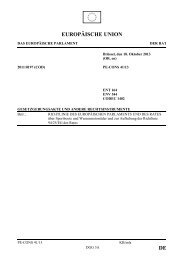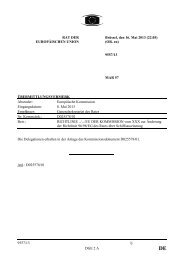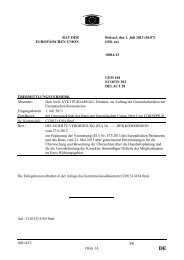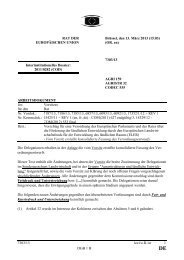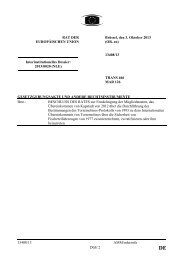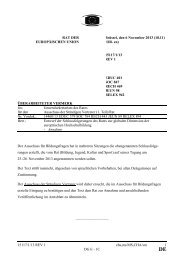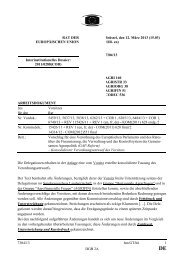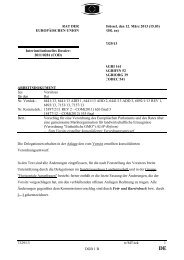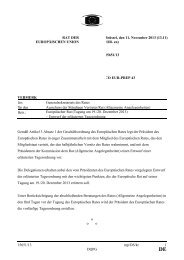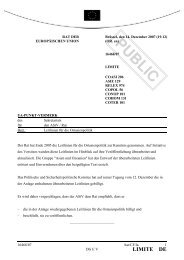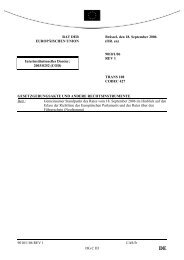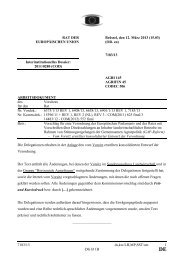European Council conclusions
European Council conclusions
European Council conclusions
Create successful ePaper yourself
Turn your PDF publications into a flip-book with our unique Google optimized e-Paper software.
EUCO 205/12<br />
EUROPEA COUCIL Brussels, 14 December 2012<br />
COVER OTE<br />
from : General Secretariat of the <strong>Council</strong><br />
to : Delegations<br />
Subject : EUROPEA COUCIL<br />
13/14 DECEMBER 2012<br />
COCLUSIOS<br />
EUCO 205/12<br />
CO EUR 19<br />
COCL 5<br />
Delegations will find attached the <strong>conclusions</strong> of the <strong>European</strong> <strong>Council</strong> (13/14 December 2012).<br />
________________________<br />
E
Conclusions – 13/14 December 2012<br />
The <strong>European</strong> <strong>Council</strong> agreed on a roadmap for the completion of the Economic and Monetary<br />
Union, based on deeper integration and reinforced solidarity. This process will begin with the<br />
completion, strengthening and implementation of the new enhanced economic governance, as well<br />
as the adoption of the Single Supervisory Mechanism and of the new rules on recovery and<br />
resolution and on deposit guarantees. This will be completed by the establishment of a single<br />
resolution mechanism. A number of other important issues will be further examined by the June<br />
2013 <strong>European</strong> <strong>Council</strong>, concerning the coordination of national reforms, the social dimension of<br />
EMU, the feasibility and modalities of mutually agreed contracts for competitiveness and growth,<br />
and solidarity mechanisms and measures to promote the deepening of the Single Market and to<br />
protect its integrity. Throughout this process, democratic legitimacy and accountability will be<br />
ensured.<br />
The <strong>European</strong> <strong>Council</strong> launched work on the 2013 <strong>European</strong> Semester on the basis of the<br />
Commission's Annual Growth Survey. It decided to launch work on the further development of the<br />
EU's Common Security and Defence Policy and will return to this issue in December 2013.<br />
I. ECOOMIC POLICY<br />
Roadmap for the completion of EMU<br />
1. In the light of the fundamental challenges facing it, the Economic and Monetary Union needs<br />
to be strengthened to ensure economic and social welfare as well as stability and sustained<br />
prosperity. Economic policies must be fully geared towards promoting strong, sustainable and<br />
inclusive economic growth, ensuring fiscal discipline, enhancing competitiveness and<br />
boosting employment, and in particular youth employment, in order for Europe to remain a<br />
highly competitive social market economy and to preserve the <strong>European</strong> social model.<br />
2. The consolidation of EMU rests not only on completing its architecture but also on pursuing<br />
differentiated, growth-friendly and sound fiscal policies. While fully respecting the Stability<br />
and Growth Pact, the possibilities offered by the EU's existing fiscal framework to balance<br />
productive public investment needs with fiscal discipline objectives can be exploited in the<br />
preventive arm of the SGP.<br />
EUCO 205/12 1<br />
E
Conclusions – 13/14 December 2012<br />
3. Further to the interim report submitted in October 2012, the President of the <strong>European</strong><br />
<strong>Council</strong>, in close collaboration with the Presidents of the Commission, the <strong>European</strong> Central<br />
Bank and the Eurogroup, has drawn up a specific and time-bound road map for the<br />
achievement of genuine Economic and Monetary Union. The <strong>European</strong> <strong>Council</strong> notes the<br />
"Blueprint" issued by the Commission which provides a comprehensive analysis of the<br />
relevant issues combined with an assessment of their legal aspects. It also notes the<br />
contributions made by the <strong>European</strong> Parliament. The <strong>European</strong> <strong>Council</strong> sets out the next steps<br />
in the process of completing EMU, based on deeper integration and reinforced solidarity for<br />
the euro area Member States.<br />
4. The process of completing EMU will build on the EU's institutional and legal framework. It<br />
will be open and transparent towards Member States not using the single currency.<br />
Throughout the process the integrity of the Single Market will be fully respected, including in<br />
the different legislative proposals which will be made. It is also important to ensure a level<br />
playing field between Member States which take part in the SSM and those which do not.<br />
5. The immediate priority is to complete and implement the framework for stronger economic<br />
governance, including the "six-pack", the Treaty on Stability, Coordination and Governance<br />
(TSCG) and the "two-pack". Following the decisive progress achieved on the key elements of<br />
the "two-pack", the <strong>European</strong> <strong>Council</strong> calls for its rapid adoption by the co-legislators.<br />
6. It is equally urgent to advance towards a more integrated financial framework, which will<br />
help restore normal lending, improve competitiveness and help bring about the necessary<br />
adjustment to our economies.<br />
EUCO 205/12 2<br />
E
Conclusions – 13/14 December 2012<br />
7. The Single Supervisory Mechanism constitutes a major qualitative step towards a more<br />
integrated financial framework. The <strong>European</strong> <strong>Council</strong> welcomes the agreement reached<br />
within the <strong>Council</strong> on 13 December and calls on the co-legislators to rapidly agree so as to<br />
allow its implementation as soon as possible. It also reiterates the importance of the new rules<br />
on capital requirements for banks (CRR/CRD), which are of the utmost priority so as to<br />
develop a single rule book, and calls on all parties to work towards their agreement and rapid<br />
adoption.<br />
8. The <strong>European</strong> <strong>Council</strong> urges the co-legislators to agree on the proposals for a Recovery and<br />
Resolution Directive and for a Deposit Guarantee Scheme Directive before June 2013; the<br />
<strong>Council</strong> for its part should reach agreement by the end of March 2013. Once adopted, these<br />
Directives should be implemented by the Member States as a matter of priority.<br />
9. The <strong>European</strong> <strong>Council</strong> looks forward to the Commission's rapid follow up to the proposals of<br />
the high level expert group on the structure of the EU banking sector.<br />
10. It is imperative to break the vicious circle between banks and sovereigns. Further to the June<br />
2012 euro area Summit statement and the October 2012 <strong>European</strong> <strong>Council</strong> <strong>conclusions</strong>, an<br />
operational framework, including the definition of legacy assets, should be agreed as soon as<br />
possible in the first semester of 2013, so that when an effective single supervisory mechanism<br />
is established, the <strong>European</strong> Stability Mechanism will, following a regular decision, have the<br />
possibility to recapitalise banks directly. This will be done in full compliance with the Single<br />
Market.<br />
EUCO 205/12 3<br />
E
Conclusions – 13/14 December 2012<br />
11. In a context where bank supervision is effectively moved to a single supervisory mechanism,<br />
a single resolution mechanism will be required, with the necessary powers to ensure that any<br />
bank in participating Member States can be resolved with the appropriate tools. Therefore,<br />
work on the proposals for a Recovery and Resolution Directive and for a Deposit Guarantee<br />
Scheme Directive should be accelerated so that they can be adopted in line with paragraph 8.<br />
In these matters, it is important to ensure a fair balance between home and host countries. The<br />
Commission will submit in the course of 2013 a proposal for a single resolution mechanism<br />
for Member States participating in the SSM, to be examined by the co-legislators as a matter<br />
of priority with the intention of adopting it during the current parliamentary cycle. It should<br />
safeguard financial stability and ensure an effective framework for resolving financial<br />
institutions while protecting taxpayers in the context of banking crises. The single resolution<br />
mechanism should be based on contributions by the financial sector itself and include<br />
appropriate and effective backstop arrangements. This backstop should be fiscally neutral<br />
over the medium term, by ensuring that public assistance is recouped by means of ex post<br />
levies on the financial industry.<br />
12. In order for the EMU to ensure economic growth, competitiveness in the global context and<br />
employment in the EU and in particular in the euro area, a number of other important issues<br />
related to the coordination of economic policies and economic policy guidelines of the euro<br />
area will need to be further examined, including measures to promote the deepening of the<br />
Single Market and to protect its integrity. To this end, the President of the <strong>European</strong> <strong>Council</strong>,<br />
in close cooperation with the President of the Commission, after a process of consultations<br />
with the Member States, will present to the June 2013 <strong>European</strong> <strong>Council</strong> possible measures<br />
and a time-bound roadmap on the following issues:<br />
a) coordination of national reforms: the participating Member States will be invited to<br />
ensure, in line with Article 11 of the TSCG, that all major economic policy reforms that<br />
they plan to undertake will be discussed ex ante and, where appropriate, coordinated<br />
among themselves. Such coordination shall involve the institutions of the EU as<br />
required by EU law to this end. The Commission has announced its intention to make a<br />
proposal for a framework for ex ante coordination of major economic policy reforms in<br />
the context of the <strong>European</strong> Semester;<br />
EUCO 205/12 4<br />
E
Conclusions – 13/14 December 2012<br />
b) the social dimension of the EMU, including social dialogue;<br />
c) the feasibility and modalities of mutually agreed contracts for competitiveness and<br />
growth: individual arrangements of a contractual nature with EU institutions could<br />
enhance ownership and effectiveness. Such arrangements should be differentiated<br />
depending on Member States' specific situations. This would engage all euro area<br />
Member States, but non euro Member States may also choose to enter into similar<br />
arrangements;<br />
d) solidarity mechanisms that can enhance the efforts made by the Member States that<br />
enter into such contractual arrangements for competitiveness and growth.<br />
13. Governance within the euro area should be further improved, building on the TSCG and<br />
taking into account the euro area Summit statement of 26 October 2011. The euro area Heads<br />
of State or Government will be invited to adopt rules of procedure for their meetings at their<br />
meeting in March 2013, fully respecting Article 12.3 TSCG.<br />
14. Throughout the process, the general objective remains to ensure democratic legitimacy and<br />
accountability at the level at which decisions are taken and implemented. Any new steps<br />
towards strengthening economic governance will need to be accompanied by further steps<br />
towards stronger legitimacy and accountability. At national level, moves towards further<br />
integration of the fiscal and economic policy frameworks would require that Member States<br />
ensure the appropriate involvement of their parliaments. Further integration of policy making<br />
and greater pooling of competences must be accompanied by a commensurate involvement of<br />
the <strong>European</strong> Parliament. New mechanisms increasing the level of cooperation between<br />
national parliaments and the <strong>European</strong> Parliament, in line with Article 13 of the TSCG and<br />
Protocol No 1 to the Treaties, can contribute to this process. The <strong>European</strong> Parliament and<br />
national parliaments will determine together the organisation and promotion of a conference<br />
of their representatives to discuss EMU related issues.<br />
EUCO 205/12 5<br />
E
Annual Growth Survey<br />
Conclusions – 13/14 December 2012<br />
15. The <strong>European</strong> <strong>Council</strong> welcomes the timely submission of the Annual Growth Survey<br />
(AGS) by the Commission, which launches the 2013 <strong>European</strong> semester. It agrees that efforts<br />
at national and <strong>European</strong> level in 2013 should continue to focus on the five priorities agreed<br />
last March, namely to:<br />
– pursue differentiated, growth-friendly, fiscal consolidation,<br />
– restore normal lending to the economy,<br />
– promote growth and competitiveness,<br />
– tackle unemployment and the social consequences of the crisis, and<br />
– modernise public administration.<br />
16. The <strong>Council</strong> will examine in further detail the AGS package in accordance with the roadmap<br />
presented by the incoming Presidency and following the recommendations outlined in the<br />
Presidency report on lessons learned from the 2012 <strong>European</strong> Semester, with a view to<br />
providing its views to the March 2013 <strong>European</strong> <strong>Council</strong>. The <strong>European</strong> <strong>Council</strong> will then<br />
agree on the required guidance for Member States' Stability and Convergence Programmes<br />
and National Reform Programmes as well as for the implementation of the EU's flagship<br />
initiatives. The Commission is invited to include in its next Annual Growth Survey an<br />
assessment of the performance of labour and product markets with a view to promoting jobs<br />
and growth.<br />
EUCO 205/12 6<br />
E
Conclusions – 13/14 December 2012<br />
17. The completion of the Single Market can contribute much to growth and jobs and constitutes<br />
a key element of the EU's response to the financial, economic and social crisis. The <strong>European</strong><br />
<strong>Council</strong> took stock of the state of play as regards the priority proposals of the Single Market<br />
Act I and welcomed the agreement reached among participating Member States on the<br />
Unitary Patent as well as the agreement on Alternative Dispute Resolution and Online Dispute<br />
Resolution for consumer disputes. It calls on the co-legislators to conclude the remaining<br />
SMA I files as a matter of urgency. In particular, work should be speeded up on professional<br />
qualifications, public procurement, posting of workers and e-signature and e-identification. As<br />
regards the Single Market Act II, the <strong>European</strong> <strong>Council</strong> calls on the Commission to present all<br />
key proposals by the spring of 2013. It invites the <strong>Council</strong> and the <strong>European</strong> Parliament to<br />
give these proposals the highest priority with a view to their adoption by the end of the current<br />
parliamentary cycle at the latest. It is also important to take urgent action in line with the<br />
Commission's communications on implementation of the Services Directive and on Single<br />
Market governance. The <strong>European</strong> <strong>Council</strong> will keep progress on all single market proposals<br />
under close review.<br />
18. The <strong>European</strong> <strong>Council</strong> calls for the rapid examination of the Commission's communication on<br />
"Smart Regulation" and looks forward to the publication of the first SME scoreboard. The<br />
<strong>European</strong> <strong>Council</strong> welcomes the proposals by the Commission to reduce regulatory burdens<br />
and scrap regulations that are no longer of use as part of its overall approach to "Smart<br />
Regulation". It looks forward to concrete progress and a report back at its March 2013<br />
meeting.<br />
EUCO 205/12 7<br />
E
Conclusions – 13/14 December 2012<br />
19. Recalling the January 2012 Statement of Heads of State or Government and the <strong>conclusions</strong><br />
of its meetings in March, June and October, the <strong>European</strong> <strong>Council</strong> welcomes the progress<br />
made during the year towards a comprehensive EU approach to youth employment. It calls<br />
on the <strong>Council</strong> to give consideration to the proposals of the Youth Employment Package<br />
without delay, in particular with a view to adopting the recommendation on a Youth<br />
Guarantee at an early date in 2013 while taking into account national situations and needs. It<br />
invites the Commission to rapidly finalise the quality framework for traineeships, establish the<br />
Alliance for Apprenticeships as well as propose the new EURES regulation. The <strong>Council</strong>, the<br />
Member States, and the Commission should ensure rapid follow-up to the Commission<br />
communication on "Rethinking Education".<br />
II. OTHER ITEMS<br />
Common Security and Defence Policy<br />
20. The <strong>European</strong> <strong>Council</strong> recalls its <strong>conclusions</strong> of December 2008 and notes that in today's<br />
changing world the <strong>European</strong> Union is called upon to assume increased responsibilities in the<br />
maintenance of international peace and security in order to guarantee the security of its<br />
citizens and the promotion of its interests.<br />
EUCO 205/12 8<br />
E
Conclusions – 13/14 December 2012<br />
21. In this regard, the <strong>European</strong> <strong>Council</strong> remains committed to enhancing the effectiveness of the<br />
Common Security and Defence Policy (CSDP) as a tangible EU contribution to international<br />
crisis management. The EU plays an important role in its neighbourhood and globally. The<br />
<strong>European</strong> <strong>Council</strong> recalls that CSDP missions and operations are an essential element of the<br />
EU's comprehensive approach in crisis regions, such as the Western Balkans, the Horn of<br />
Africa, the Middle East, Sahel, Afghanistan and the South Caucasus and remains committed<br />
to increasing their operational effectiveness and efficiency. It also recalls that CSDP missions<br />
and operations should be carried out in close cooperation with other relevant international<br />
actors, such as the UN, NATO, the OSCE and the African Union, as well as partner countries,<br />
as called for in each specific situation. Enhancing the cooperation with interested partners in<br />
Europe's neighbourhood is of particular importance in this regard.<br />
22. To deliver on security responsibilities, the <strong>European</strong> <strong>Council</strong> underlines that EU Member<br />
States must be ready to provide future-oriented capabilities, both in the civilian domain and in<br />
the field of defence. The <strong>European</strong> <strong>Council</strong> stresses that current financial constraints highlight<br />
the urgent necessity to strengthen <strong>European</strong> cooperation in order to develop military<br />
capabilities and fill the critical gaps, including those identified in recent operations. It also<br />
underlines the benefits such cooperation may have for employment, growth, innovation and<br />
industrial competitiveness within the <strong>European</strong> Union.<br />
23. The <strong>European</strong> <strong>Council</strong> invites the High Representative, notably through the <strong>European</strong><br />
External Action Service and the <strong>European</strong> Defence Agency, as well as the Commission, all<br />
acting in accordance with their respective responsibilities and cooperating closely as required,<br />
to develop further proposals and actions to strengthen CSDP and improve the availability of<br />
the required civilian and military capabilities, and to report on such initiatives, at the latest by<br />
September 2013, with a view to the December 2013 <strong>European</strong> <strong>Council</strong>. Member States will<br />
be closely involved throughout this process.<br />
EUCO 205/12 9<br />
E
Conclusions – 13/14 December 2012<br />
24. To that end, the <strong>European</strong> <strong>Council</strong> underlines i.a. the following issues:<br />
Increase the effectiveness, visibility and impact of CSDP by<br />
− further developing the comprehensive approach to conflict prevention, crisis<br />
management and stabilisation, including by developing the ability to respond to<br />
emerging security challenges;<br />
− strengthening the EU's ability to deploy the right civilian and military capabilities and<br />
personnel rapidly and effectively on the whole spectrum of crisis management action.<br />
Enhance the development of defence capabilities by<br />
− identifying current redundancies and capabilities shortfalls and prioritising future<br />
requirements for <strong>European</strong> civilian and military capabilities;<br />
− facilitating a more systematic and longer term <strong>European</strong> defence cooperation, including<br />
through "pooling and sharing" of military capabilities; and in this regard, systematically<br />
considering cooperation from the outset in national defence planning by Member States;<br />
− facilitating synergies between bilateral, sub-regional, <strong>European</strong> and multilateral<br />
initiatives, including the EU's "pooling and sharing" and NATO's "smart defence".<br />
Strengthen Europe's defence industry by<br />
− developing a more integrated, sustainable, innovative and competitive <strong>European</strong><br />
defence technological and industrial base;<br />
− developing greater synergies between civilian and military research and development;<br />
promoting a well-functioning defence market, in particular through the effective<br />
implementation of the directives on public procurement and on intra-EU transfers, open<br />
to SMEs and benefiting from their contributions.<br />
EUCO 205/12 10<br />
E
Conclusions – 13/14 December 2012<br />
25. The <strong>European</strong> <strong>Council</strong> will in December 2013 review progress achieved in pursuing these<br />
goals, assess the situation and, on the basis of recommendations by its President, provide<br />
guidance, including by setting priorities and timelines, to ensure the effectiveness of EU<br />
efforts aimed at meeting Europe's security responsibilities.<br />
Regional Strategies<br />
26. Recalling its June 2011 <strong>conclusions</strong>, and subject to the evaluation of the concept of macro<br />
regional strategies as foreseen in the <strong>Council</strong> <strong>conclusions</strong> of 13 April 2011, the <strong>European</strong><br />
<strong>Council</strong> looks forward to the presentation by the Commission of a new EU Strategy for the<br />
Adriatic and Ionian region before the end of 2014. It also calls for the prompt implementation<br />
of the revised EU strategy for the Baltic Sea. In order to enhance co-operation with the<br />
neighbouring countries the <strong>European</strong> <strong>Council</strong> encourages the <strong>Council</strong> to take further action to<br />
make full use of the Northern Dimension and its partnerships.<br />
Enlargement and the Stabilisation and Association Process<br />
27. The <strong>European</strong> <strong>Council</strong> welcomes and endorses the <strong>conclusions</strong> adopted by the <strong>Council</strong> on<br />
11 December on Enlargement and the Stabilisation and Association Process.<br />
EUCO 205/12 11<br />
E
Syria<br />
Conclusions – 13/14 December 2012<br />
28. The <strong>European</strong> <strong>Council</strong> is appalled by the increasingly deteriorating situation in Syria. It<br />
endorses the <strong>conclusions</strong> adopted by the <strong>Council</strong> on 10 December. The <strong>European</strong> <strong>Council</strong> also<br />
welcomes the results of the 4th Ministerial meeting of the Group of Friends of the Syrian<br />
people, held in Marrakech on the 12th of December 2012. The <strong>European</strong> <strong>Council</strong> tasks the<br />
Foreign Affairs <strong>Council</strong> to work on all options to support and help the opposition and to<br />
enable greater support for the protection of civilians. The <strong>European</strong> <strong>Council</strong> repeats its view<br />
that political transition is necessary in Syria towards a future without President Assad and his<br />
illegitimate regime. We support a future that is democratic and inclusive with full support for<br />
Human Rights and the rights of minorities. The <strong>European</strong> <strong>Council</strong> will continue to address the<br />
situation in Syria as a matter of priority.<br />
EUCO 205/12 12<br />
E



